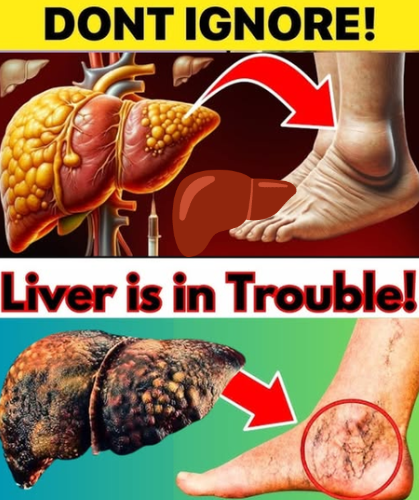
Your body is smarter than you might think. It often sends out subtle warnings long before a serious health issue develops. But here’s the catch—most people ignore them. One of the most surprising early indicators of liver trouble doesn’t show up in your stomach or your skin—it appears in your feet.
That’s right. Your feet can reveal critical clues about your liver’s condition. If you’ve noticed swelling, itchiness, cold sensations, or even strange discoloration, these could be your liver’s way of asking for help. Let’s uncover the most common foot-related signs of liver issues and why you shouldn’t brush them off.
Swollen Feet and Ankles: A Red Flag for Liver Stress
Ever come home after a long day and notice your ankles look puffy? While occasional swelling can come from standing too long, persistent swelling—also known as edema—may point to liver problems. The liver produces a protein called albumin, which keeps fluid in your bloodstream. When the liver struggles to function, albumin levels drop, causing fluid to leak into tissues and pool in the lower body.
What to watch for:
- Swelling that doesn’t improve with rest or elevation
- Puffiness combined with abdominal bloating or yellowing of the skin
- Possible connection to cirrhosis or liver failure
If swelling lingers or worsens, it’s not just fatigue—you should seek medical evaluation immediately.
Yellow Feet or Skin: The Hidden Sign of Jaundice
When people think of jaundice, they usually picture yellow eyes. But bilirubin buildup—a byproduct the liver normally filters out—can also turn your feet yellow. This change in color is a big red flag that your liver isn’t keeping up.
What to watch for:
- Yellowish tint in the feet or toenails
- Dark urine, nausea, or unexplained fatigue
- Possible links to hepatitis, liver cancer, or advanced liver disease
Jaundice is never something to ignore. If your feet start taking on a yellow hue, it’s time to see a doctor without delay.
Itchy Soles: A Sneaky Sign of Cholestasis
Itchy feet might sound harmless, especially if there’s no rash. But persistent itching, particularly at night, can signal cholestasis—a condition where bile flow slows or gets blocked. Without proper bile movement, toxins build up and trigger maddening itchiness.
What to watch for:
- Intense itching on the soles, often worse at night
- Other symptoms like pale stools, dark urine, or fatigue
- Possible causes include hepatitis, bile duct blockages, or liver complications during pregnancy
If you find yourself scratching your feet constantly without an obvious cause, your liver might be the hidden culprit.
Video : How Your Feet Are Warning You About Your Liver Problems – Dr. Berg Explains
Foot Pain or Tenderness: Linked to Liver Inflammation
Foot pain isn’t always about bad shoes or standing too long. Sometimes, liver inflammation or toxin buildup can trigger pain in the feet. When the liver struggles, it affects circulation and nerve health, which can cause unexplained tenderness or discomfort.
What to watch for:
- Ongoing foot pain that doesn’t improve with rest
- Accompanying symptoms like swelling, digestive problems, or fatigue
- Possible connection to fatty liver disease or viral hepatitis
If foot pain feels out of place and persists despite lifestyle changes, it’s worth getting your liver checked.
Yellow or Brittle Toenails: A Silent Clue in Nail Health
Your toenails act like a health diary, quietly recording internal imbalances. Yellow, pale, or brittle toenails may point to liver dysfunction. Poor circulation, toxin buildup, and nutritional deficiencies caused by liver issues can all affect nail growth and appearance.
What to watch for:
- Pale or yellowish nails
- Nails that thicken, ridge, or break easily
- Signs of poor detoxification or immune weakness
Noticing nail changes? It’s a subtle but valuable reason to pay closer attention to your liver health.
Cold Feet: A Sign of Poor Circulation from Liver Problems
Do your feet always feel cold—even in warm weather? This could signal poor circulation linked to liver stress. When the liver isn’t filtering properly, oxygen delivery throughout the body suffers. Your feet, being farthest from the heart, often feel it first.
What to watch for:
- Cold feet that persist regardless of the temperature
- Fatigue, weakness, or dizziness along with the chill
- Possible ties to reduced oxygen supply caused by liver dysfunction
If your feet are constantly cold without a clear reason, your circulatory system—and your liver—deserve a closer look.
Why Your Feet Reveal So Much About Liver Health
You might be wondering, why the feet? Here’s the answer: your feet are at the “end of the line” when it comes to circulation. Any disruption in fluid balance, nutrient transport, or detoxification caused by a stressed liver often shows up there first. Think of your feet like the check-engine light of your body—they’re small but mighty messengers.
When to Take Action
Your liver is essential for detoxification, digestion, and overall health. Ignoring the early signs can allow problems to snowball into something much more dangerous. If you notice more than one of the symptoms—especially when combined with fatigue, digestive issues, or yellowing of the skin—it’s time to get professional help. A simple blood test can often reveal how well your liver is functioning.
Video : How to Use Your Feet to Diagnose Liver Problems—Dr. Berg Explains
Final Thoughts: Listen to Your Feet, Save Your Liver
Your feet may seem far removed from your liver, but they’re often the first to reveal trouble brewing inside your body. From swelling and itching to nail changes and coldness, these subtle signals shouldn’t be dismissed. They’re your body’s way of whispering before it starts shouting.
So the next time your feet feel “off,” don’t just blame your shoes. Pay attention, because your liver may be sending you a message that could protect your long-term health.


